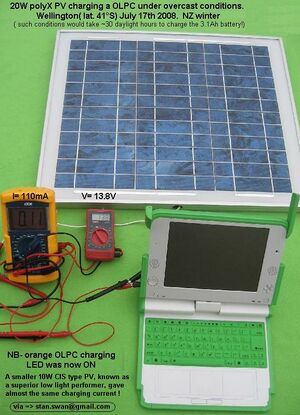Peripherals/Solar Panel: Difference between revisions
No edit summary |
No edit summary |
||
| Line 4: | Line 4: | ||
Research on photo-voltaic (PV) solar panels for the XO laptop: [[XO_Solar]]. |
Research on photo-voltaic (PV) solar panels for the XO laptop: [[XO_Solar]]. |
||
--------------------------------------------------------------------------- |
--------------------------------------------------------------------------- |
||
[[Image:xopolyx.jpg]] |
[[Image:xopolyx.jpg|thumb]] |
||
Diverse seasonal tests have show ~10W solar panels may be the cost versus performance XO "sweet spot", as such PVs are compact & typically produce 600mA on a sunny day at ~14V. This may be just enough to run an XO-1 directly from the sun! A beefier PV (15-20W?) will be needed to both run AND charge an XO however. The battery in an XO-1 is 3.1Ah capacity, so some 6 sunny hours with a 10W PV would be needed to charge it with the laptop off. As this is a typical school day a spare battery may thus be needed. |
Diverse seasonal tests have show ~10W solar panels may be the cost versus performance XO "sweet spot", as such PVs are compact & typically produce 600mA on a sunny day at ~14V. This may be just enough to run an XO-1 directly from the sun! A beefier PV (15-20W?) will be needed to both run AND charge an XO however. The battery in an XO-1 is 3.1Ah capacity, so some 6 sunny hours with a 10W PV would be needed to charge it with the laptop off. As this is a typical school day a spare battery may thus be needed. |
||
Revision as of 23:32, 3 August 2008
Research on photo-voltaic (PV) solar panels for the XO laptop: XO_Solar.
Diverse seasonal tests have show ~10W solar panels may be the cost versus performance XO "sweet spot", as such PVs are compact & typically produce 600mA on a sunny day at ~14V. This may be just enough to run an XO-1 directly from the sun! A beefier PV (15-20W?) will be needed to both run AND charge an XO however. The battery in an XO-1 is 3.1Ah capacity, so some 6 sunny hours with a 10W PV would be needed to charge it with the laptop off. As this is a typical school day a spare battery may thus be needed.
NB- the nature of local solar resources need consideration, as some newer PV types - especially CIS/CIGS (Copper Indium Gallium [di]Selenide)- perform better in overcast & hazy conditions than classic Si based poly & mono crystalline types. Cheaper amorphous Si offerings,which are usually glass based & EASILY broken,are ~5% efficient in bright sun, meaning such PVs could be inconveniently larger than more rugged Si/CIS types showing (~10%+) for the same power output.
Although appealing,flexible & folding PVs have been really designed for demanding military style conditions, & are disproportionately costly for their power ratings. Unless bullet holes are a local concern,schools will usually be able to mount better value rigid PV arrays.
As a result of fuel price hikes,global PV demand is presently (mid 2008) extremely strong, & prices have firmed. Most small PV types retail at ~US$6-10 a Watt, so allow US$60-$80 for a 10W panel. Bulk purchases may be closer to US$5 a Watt, but factor in p&p. Hence a 10W solar panel by Gold Peak,apparently available for US$26 FOB Hong Kong, may be twice this when landed.
Also see Product News for product availability
